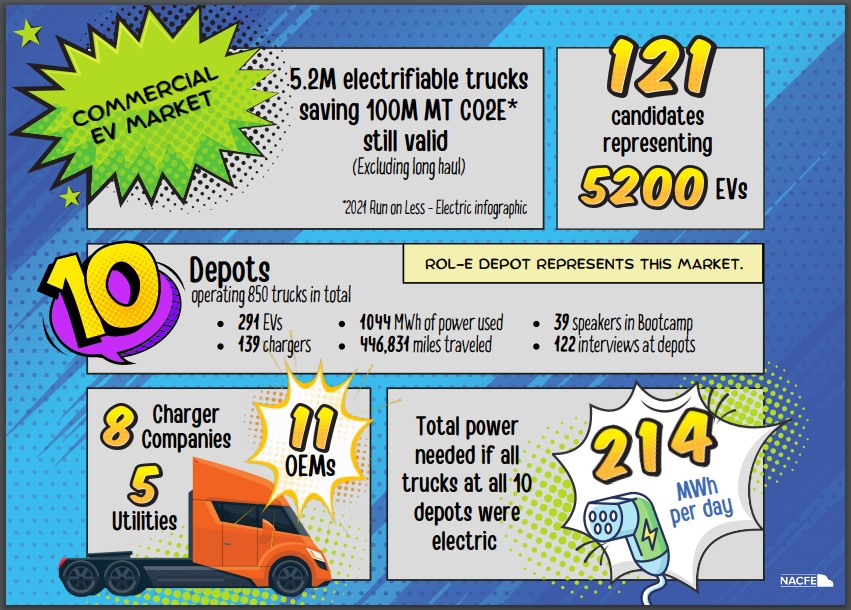Run on Less Electric – Depot shows BEVs are capable, improving
Run on Less Electric – Depot proved that truck depots can operate battery electric vehicles in large numbers in a variety of use cases, North American Council for Freight Efficiency (NACFE) research shows.
“Through Run on Less Electric – Depot we were able to show that adopters of battery electric vehicles have demonstrated that they work at scale in various segments of the trucking industry including vans and step vans, medium-duty box trucks, terminal tractors and heavy-duty regional haul,” said Mike Roeth, executive director of NACFE, which launched the three-week Run in conjunction with RMI in September.

The 10 depots operated 291 electric trucks, 22 of which NACFE followed throughout the Run.
The early lessons learned and shared in the middle of the project were proven to be valid at the conclusion of the three-week event.
“Our early findings fell into six broad categories,” Roeth said. “The data collected throughout the 18 days of the Run validated those early findings, which we expect will give fleets confidence in moving toward wider use of battery electric vehicles.”
Key findings
- Small depots are ready for electrification now and electrification at large depots is gaining momentum.
- There have been big improvements in trucks and chargers since Run on Less – Electric in 2021.
- The industry needs cost and weight reductions to improve the total cost of ownership.
- Range can be extended with multiple charges per shift at the depot and en route.
- It’s still taking too long for power delivery and infrastructure to be installed, which is driving portable/temporary charging.
- The diversity, passion and capability of the people involved is helping to scale the adoption of electric trucks.
The Run provided good news around uptime as all 22 of the studied trucks performed as expected with some exceeding expectations. For example, the Tesla Semis deployed at PepsiCo’s Sacramento Beverages depot completed 410 miles on a single charge and 1,076 miles in a single 24-hour day, enabled by fast 750 kW charging at various points during the day.
No significant loss of uptime
Also, the depots did not experience any significant loss of power or uptime of the charging systems during the 18 days.
“We also learned that improvements in the trucks, the charging infrastructure and well-thought-out implementation plans are critical to delivering the benefits of electric trucks on a wider scale,” Roeth added.
All trucks were tracked using Geotab technology capturing total miles driven, miles per day, deliveries per day, battery state of charge, use of regenerative braking and other metrics.
Have your say
This is a moderated forum. Comments will no longer be published unless they are accompanied by a first and last name and a verifiable email address. (Today's Trucking will not publish or share the email address.) Profane language and content deemed to be libelous, racist, or threatening in nature will not be published under any circumstances.